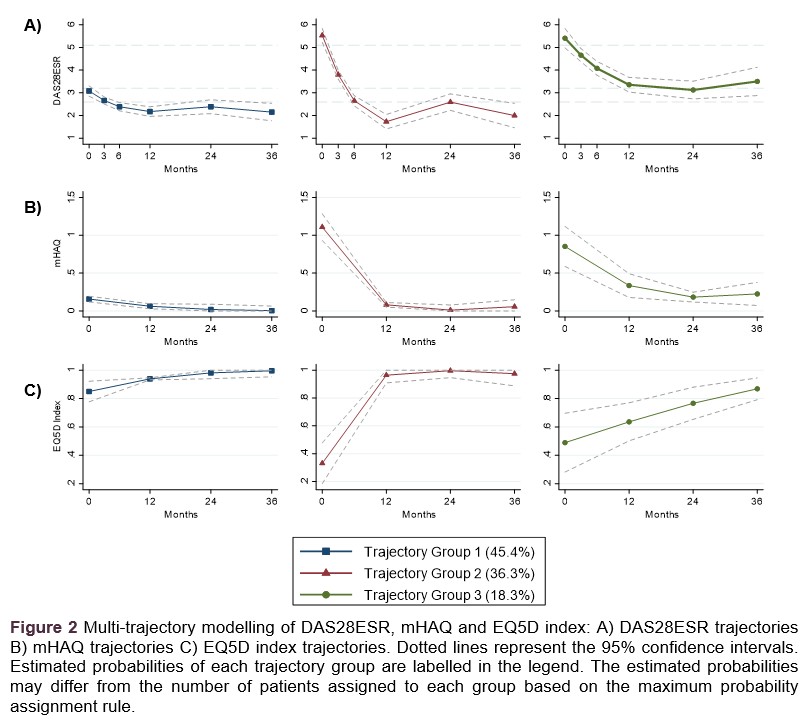Session Information
Session Type: ACR Poster Session C
Session Time: 9:00AM-11:00AM
Background/Purpose:
Variable outcomes in early rheumatoid arthritis (ERA) may be explained by heterogeneous latent disease activity trajectories, the predictors of which are not well defined. Hence, the study aims to characterise distinct disease activity trajectories and describe the relationship between disease, disability and health-related quality of life (HRQoL) trajectories.
Methods:
Data were collected prospectively from patients in the Singapore Early Arthritis Cohort over 3 years. Disease activity, disability and HRQoL were assessed using the Disease Activity Score in 28 Joints with ESR (DAS28ESR), modified Health Assessment Questionnaire (mHAQ) and EuroQol-5D Index (EQ5D Index) respectively. Group-based trajectory modelling (GBTM) was used to identify latent disease activity trajectories. Multi-trajectory modelling was used to describe the relationship between disease, disability and HRQoL trajectories. Multinomial logistic regression was used to identify predictors of trajectory membership.
Results:
213 ERA patients (73.2% female, 58.2% Chinese, age 51.3 ± 12.6 years, symptom duration 21.8 ± 15.3 weeks) were included. Three disease activity trajectories were identified [T1: moderate disease activity to remission (57.8%); T2: high to low disease activity/remission (30.1%); T3: high to moderate/low disease activity (12.1%)]. Non-Chinese patients were more likely to belong to T2 and T3 as compared to T1 [RRR (95% CI) 2.29 (1.09, 4.84) and 2.03 (1.07, 5.84) respectively]. Patients with higher body mass index (BMI) were more likely while patients with tertiary education were less likely to belong to T3 compared to T1 [RRR (95% CI) 1.13 (1.02, 1.28) and 0.13 (0.02, 0.75) respectively]. Seropositivity and radiographic erosions were not significant predictors of trajectory membership. A higher proportion of patients in T3 were treated with combination disease modifying anti-rheumatic drugs (DMARDs). Trajectories of disability and HRQoL were closely associated with disease activity trajectories.
Conclusion:
In this Asian cohort of ERA patients, sociodemographic factors, rather than seropositivity and radiographic erosions, predicted poorer outcomes (trajectory 3) in spite of more aggressive treatment. Efforts to improve health-literacy may be the key to improving outcomes in these patients.
To cite this abstract in AMA style:
Zou Y, Cheung PPM, Teoh LK, Lahiri M. Sociodemographic Factors Are Predictors of Poorer Clinical Outcome Trajectories in Early Rheumatoid Arthritis: Results from the Singapore Early Arthritis Cohort [abstract]. Arthritis Rheumatol. 2018; 70 (suppl 9). https://acrabstracts.org/abstract/sociodemographic-factors-are-predictors-of-poorer-clinical-outcome-trajectories-in-early-rheumatoid-arthritis-results-from-the-singapore-early-arthritis-cohort/. Accessed .« Back to 2018 ACR/ARHP Annual Meeting
ACR Meeting Abstracts - https://acrabstracts.org/abstract/sociodemographic-factors-are-predictors-of-poorer-clinical-outcome-trajectories-in-early-rheumatoid-arthritis-results-from-the-singapore-early-arthritis-cohort/



